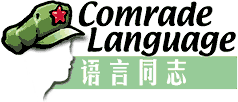|
In
English, your aunts are called aunts, uncles are uncles,
and cousins, cousins. In Chinese, everyone might as
well wear nametags with their
proper titles.
The great thing about the English language is that hardly
any linguistic distinctions are made based on gender,
social status or familial relation to the speaker. The
CCP (Chinese Communist Party) abolished most Chinese
linguistic distinctions based on social status, but
there are still so many ways to address relatives and
family members that even language study gurus Gubo and
Palanka would be at a loss to remember them all.
For example, in Chinese you call your father's older
brother bobo and his wife bomu. You call your father's
younger brother shushu and his wife shenshen. Your mother's
brother, whether younger or older, is called jiujiu
and his wife is your jiuma. In English, the words "uncle"
and "aunt" will suffice for all of the above. In English,
a Chinese-speaking Canadian who acts like a fool on
Chinese TV is called an "idiot." In Chinese he's called
Da Shan.
In Chinese, your father's sisters, both younger and
older, are called gugu. Their husbands are called gufu.
Your mother's sisters, both younger and older, are called
ayi. Their husbands are called yifu. Once again, in
English they're all called either "aunt" or "uncle."
In English, foreigners who have no Chinese friends,
eat six out of seven meals in Sanlitun "bistros" and
don't speak a word of Chinese even though they've been
here for years are called "foreign devils." In Chinese,
they're called waijiao renyuan (diplomats).
In English, your aunt's and uncle's children are all
your "cousins" regardless of what side of the family
they're on, their gender and what their age is in relation
to your own. In Chinese it's not so simple. Your father's
brother's or sister's male kids are your tangge (if
older than you) and tangd" (if younger than you). Their
female kids are tangjie (if older than you) and tangmei
(if younger than you). Your mother's brother's and sister's
male kids are your biaoge (if older than you) and biaodi
(if younger than you). Their female kids are biaojie
(if older than you) and biaomei (if younger than you).
In English, people who get paid to write about a foreign
country they don't understand the language of (and can't
take a joke about it) are called "frauds." In Chinese
they're called zhu hua waiguo jizhe (foreign correspondents
stationed in China).
In Chinese, your father's father and mother are called
yeye and nainai respectively. Your mother's father and
mother are called waipo and waigong respectively. In
English, they're all Grandma and Grandpa. In English,
a person from Hong Kong or Taiwan who comes to mainland
China to do business and looks down on mainland Chinese
people is called a "pompous moron." In Chinese, he or
she is called a tongbao (compatriot).
In Chinese, your older brother is your gege. His wife
is your saozi. Your younger brother is your didi. His
wife is called dixifu. Their sons and daughters are
your zhizi and zhinu respectively. In English, your
older and younger brother's wives are both called "aunt"
and their kids are all your "cousins." In English, cheap
booze that you choke on and could use to fuel your car
is called "moonshine." In Chinese it's called erguotou.
Then there's "expensive moonshine," known in Chinese
as maotai.
In Chinese, your older sister is your jiejie. Her husband
is your jiefu. Your younger sister is your meimei. Her
husband is your meifu. Their son and daughter are your
waisheng and waishengnu, respectively. In English, your
older and younger sister's husbands are both called
"uncle," and their kids are all "cousins," regardless
of age or gender. In English, a place where foreigners
have to pay more than twice as much as locals to get
in is called a "blatant scam." In Chinese it's called
mingshengguji ("scenic spots of historical significance").
In Chinese, your husband is your zhangfu, and his father
and mother are your gonggong and popo. Your wife is
your taitai, and her father and mother are your yuefu
and yuemu. In English, your spouse's mother and father
are called "mother-in-law" and "father-in-law." In English
someone that you have intimate relations with on a regular
basis is your "girlfriend" or "boyfriend," or simply
"lover." In Chinese, the ambiguous word pengyou (friend)
used to suffice until recently. Nowadays many young
Chinese people refer to their boyfriends and girlfriends
as nan or nu pengyou. More and more trendy young Chinese
people use the words qingren (lover) or even laogong
(husband) and laopo (wife), even if they aren't married.
Call me baoshou (conservative), but your humble Comrade
finds all that a little guofen (excessive).
Now here are some common ways to address moshenren (strangers)
in Chinese:
Babies are called baobei, or "treasure" in Chinese.
Small children can always be addressed as xiaopengyou
or "little friend." Boys and young men can be addressed
as xiaohuozi. In Beijing slang, young men are called
gemen'r which can be translated as "bro." Young women
are xiaojie, or "Miss." If a woman looks too old to
be a xiaojie, call her ayi (auntie). Similarly, you
might be better off calling a mature man shifu (lit.
master) xiansheng (mister) rather than "bro!" In English,
you would call someone who constantly complains and
tries to rip you off an "a-hole." In Chinese, they're
called chuzuqichesiji (cab drivers).
The Chinese call a spade a spade, and fat people are
routinely called pangzi (fatty). Similarly, old men
are always called laotou (lit. "old head"), and old
women are called laotaitai or "old wife." If you're
ever at a loss as to what you're supposed to call someone,
just use the trusty, although perhaps a bit outmoded,
tongzh" or "comrade." It might elicit a few derisive
titters, but that's better than a slap in the face!
|


